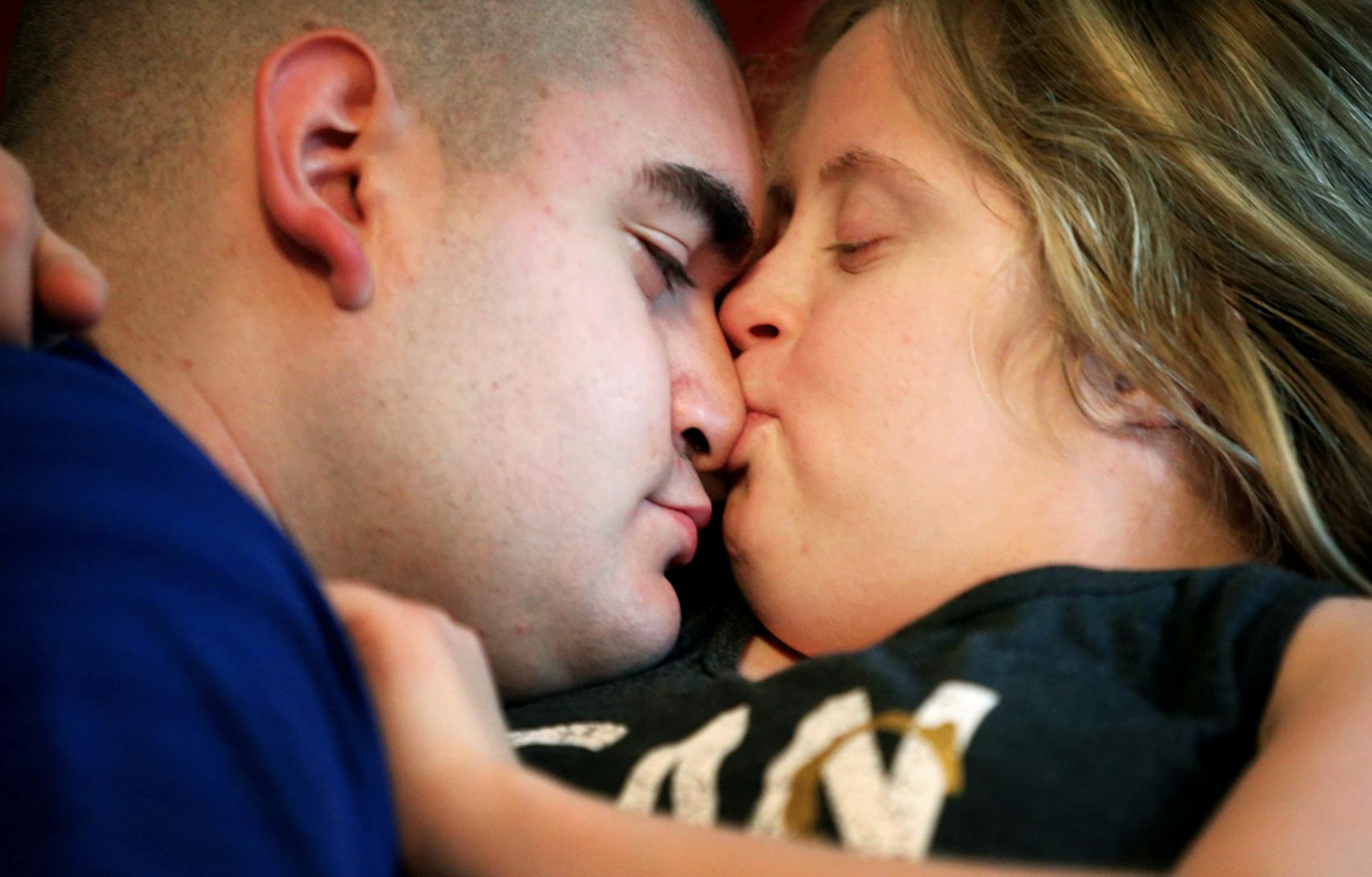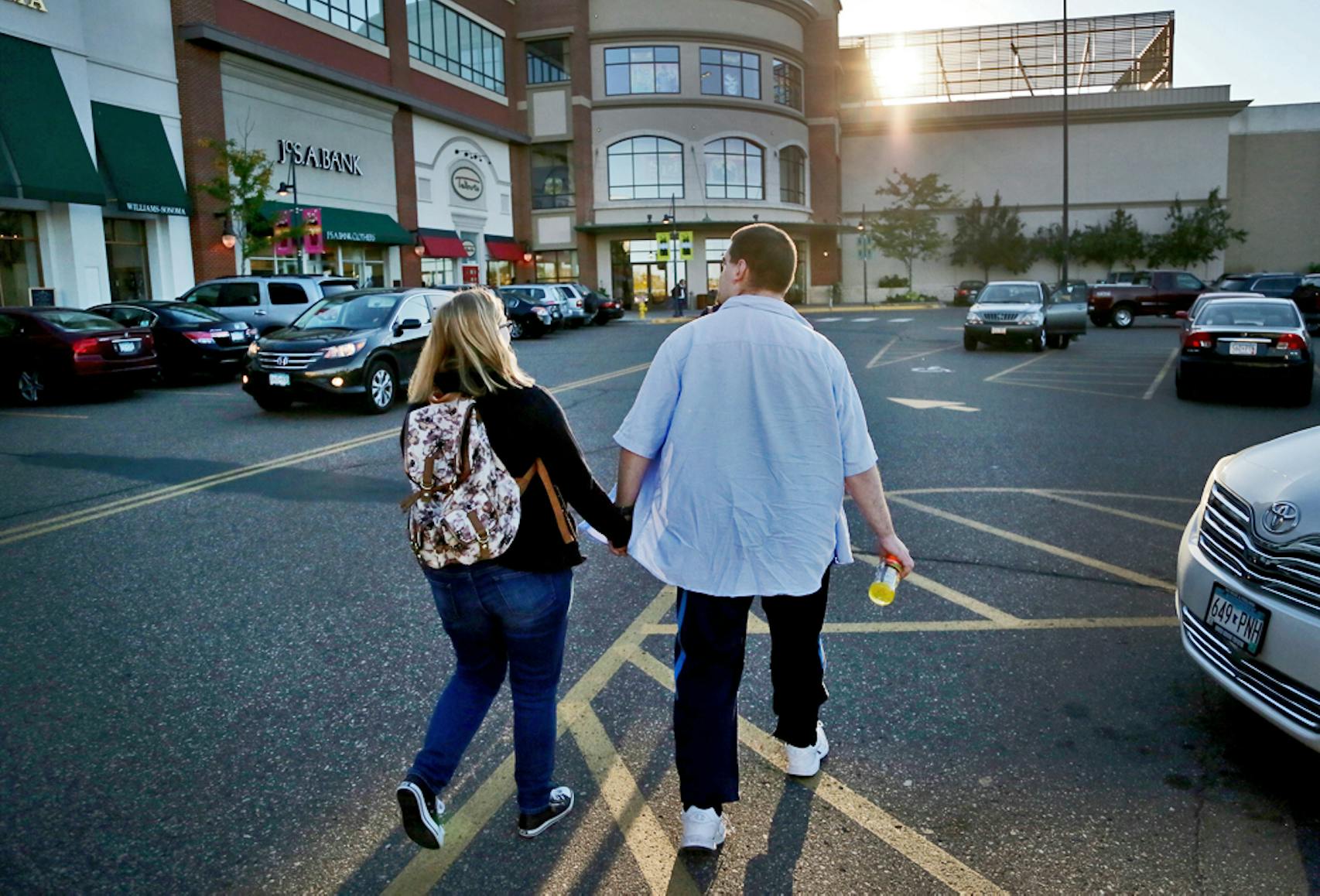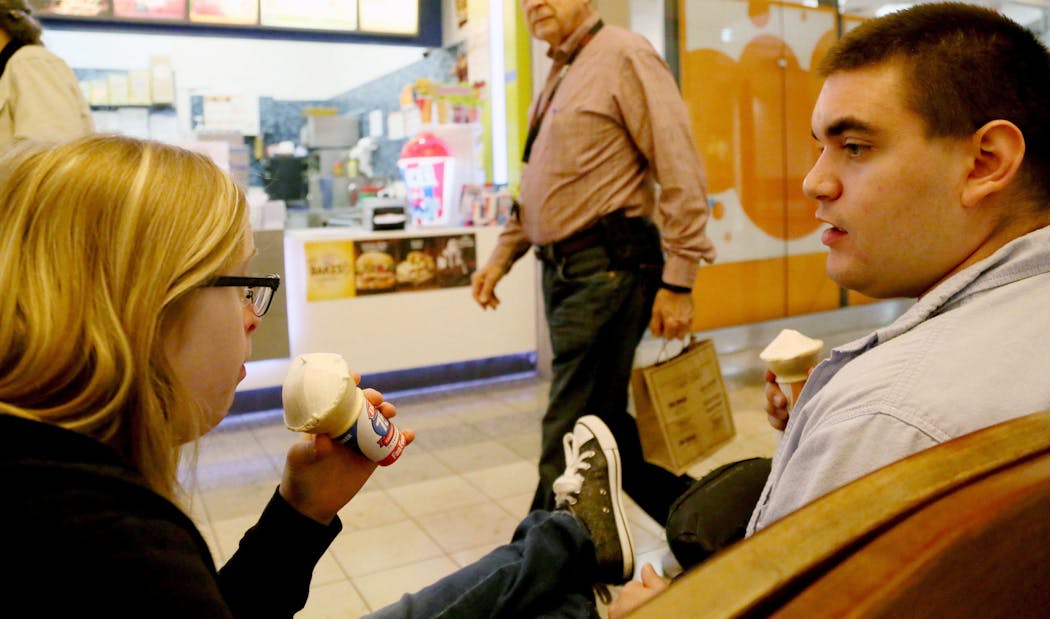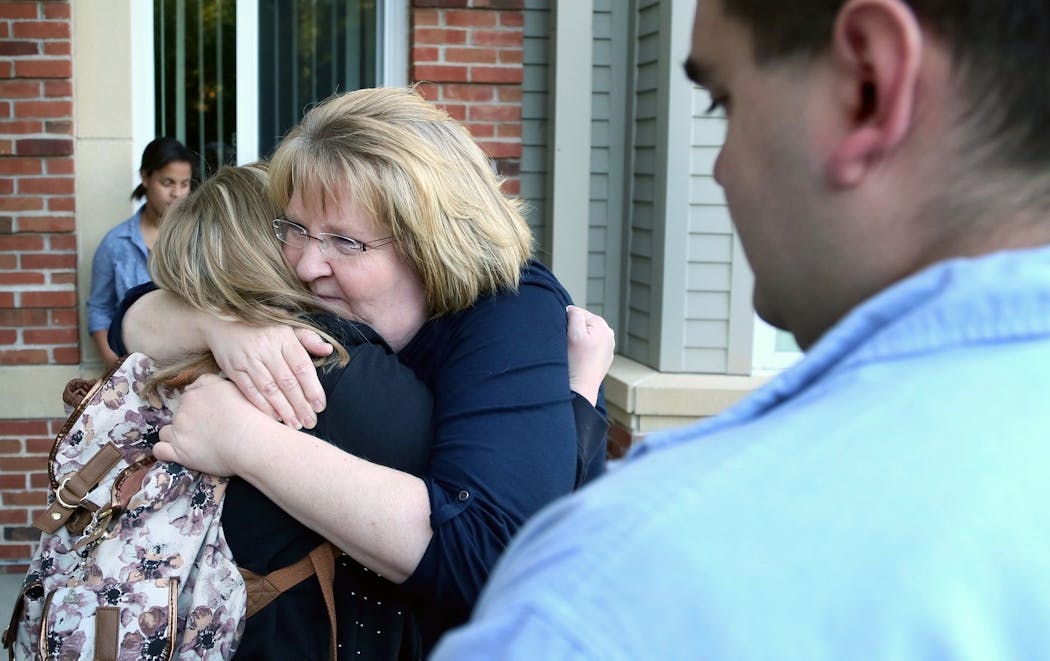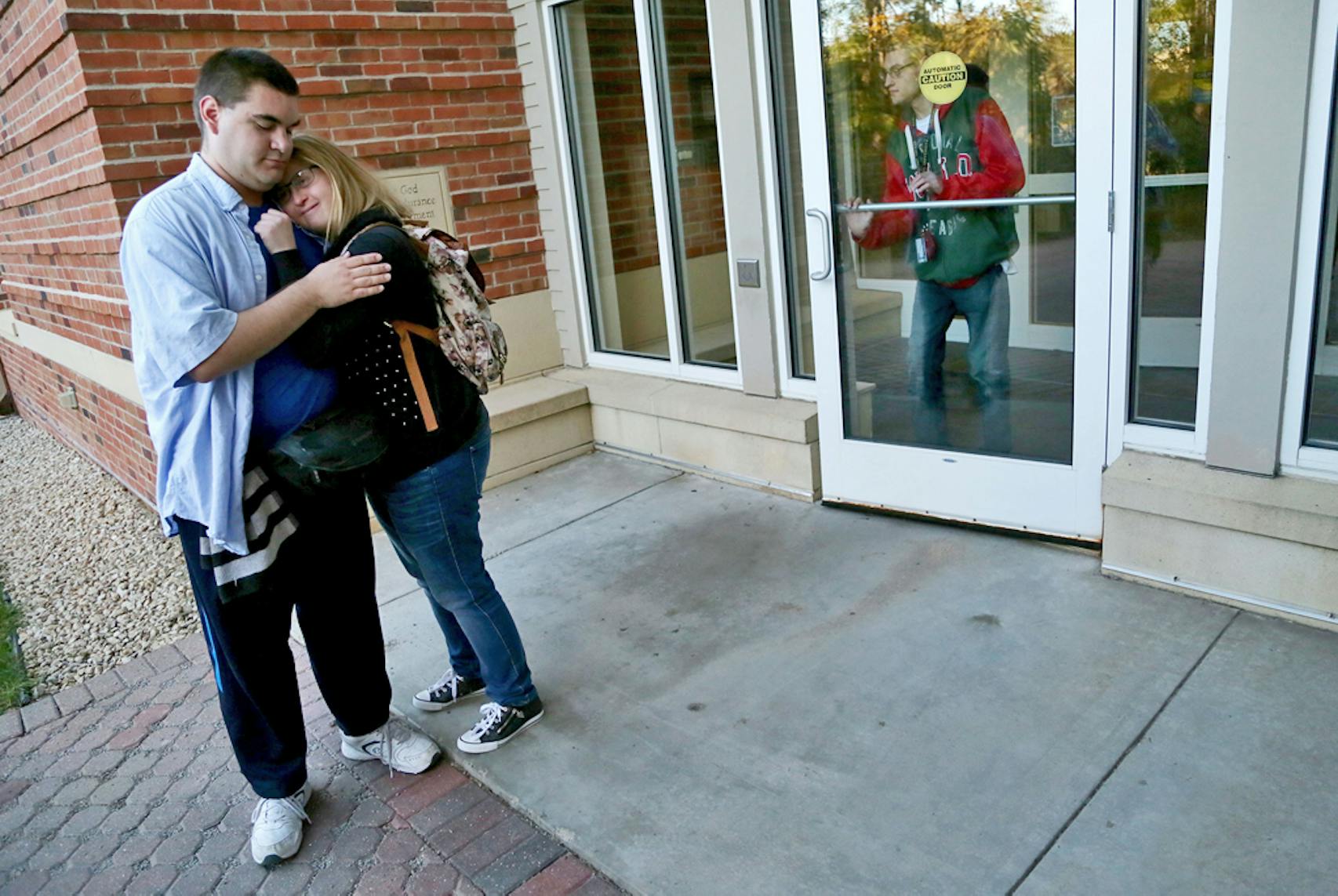Adults with disabilities must overcome constant barriers to pursue a fundamental human right – loving relationships.
Near sunset, Rachel Larson grabbed Nicholas Hamilton by the hand and pulled him down a steep embankment below a graffiti-covered bridge.
With late-summer mosquitoes buzzing around them, the two giggled and caressed each other, their voices muffled by the rush of a nearby stream and the traffic above.
"It's our secret hideaway," said Rachel, 21, who has Down syndrome, as she snuggled with Nicholas, 24, who has a developmental disability. "Here, no one can see us and we are free to do whatever we want."
For people with disabilities like Rachel and Nicholas, such freedom to be intimate is rare. Across Minnesota, disabled adults complain of having to overcome constant hurdles to engage in romantic activity and sustain loving relationships. The obstacles include arbitrary curfews, lack of transportation, and segregated housing that cuts them off from mainstream social life and opportunities to date. Often, the barriers are imposed by group home operators that place safety above intimacy.
In the isolating confines of Minnesota's more than 4,500 group homes, true intimacy can be impossible. To go on a date, adult residents generally have to obtain permission in advance, then go out under the watchful eyes of paid staff. More ambitious requests — such as spending the night in bed with a partner — can trigger a long sequence of meetings and consultations.
The physical and legal barriers are sometimes reinforced by the widely held perception that people with disabilities are "asexual," or are too helpless to consent to intimacy, advocates say.
"We are denying people [with disabilities] a fundamental part of being human — the right to have intimacy and connectedness," said Nancy Fitzsimons, a professor of social work at Minnesota State University, Mankato. "We do this because it makes us uncomfortable, without ever asking what's right for them."
Building trust
Ninety minutes.
That's all Bradley Duncan is permitted for "alone time" with the woman he fell in love with nearly a year ago.
Ninety minutes to talk, cuddle and get intimate in bed. Ninety minutes to watch their favorite wrestler, John Cena, on television.
The clock starts to tick the moment Duncan shuts the bedroom door of his room at a Fergus Falls group home.
"They set their watches and say, 'Your time starts now,' " said Duncan, who is 46 and has a cognitive disability. "Now, if it's 11:30 [a.m.], that means I've got until 5 minutes to 1 p.m., before they start knocking on the door, saying my time is up. It's not much time."
Duncan said he met his sweetheart, who is 41 and developmentally disabled, while they were sitting at opposite computer terminals at the local library. Captivated by her long blonde hair and dark eyes, Duncan introduced himself. "I said, 'Hi, I'm Brad and I'm single,' " he said. The woman, whom he declined to identify, first insisted that she was engaged, then reluctantly agreed to go out with him, Duncan said.
Their first date was a visit to the Minnesota Twins winter caravan in Fergus Falls. Over hamburgers and fries, they discussed their mutual fondness for baseball, professional wrestling and books.
"She seemed really high-strung at first," Duncan said, pointing to a framed photo of the couple on his dresser. "But she has this great personality. We're a wonderful match."
But as their relationship grew, so did the rules.
To be taken on a date, Duncan had to notify his group home staff at least 24 hours ahead of time. Gradually, he built enough trust with his girlfriend's legal guardian, who oversees her care, so the couple could visit each other at their group homes. Most days, however, Duncan's group home lacked the staff to drive him to her house; so he would walk the winding, 1 ½-mile route on his own.
Now, after nearly a year of supervised visits, Duncan said he is building up courage to ask permission for an overnight stay alone with his friend. But that will require another complicated round of negotiations. He suspects the answer will be "No." Fear of rejection has kept him from making the formal request.
"I love her," Duncan said. "But if I ask for an overnight, I'm worried that I'm going to come off as some creep, as some guy who just thinks with his pants. What are they going to think?"
Asked why a night alone with his friend is so important, Duncan shot back: "You have someone, right? Right? Well, I want that. I want to wake up in the morning and have someone there by my side and feel happy — just like everyone else."
Striking a balance
Many restrictions reflect a well-intentioned effort to keep group home residents safe. Some are subject to violent mood swings; others have problems with impulse control.
Although Minnesota law gives group home residents the right to have visitors and associate with people of their choosing, their legal guardians must nonetheless balance respect for their rights with the need for safety. One in five residents of state-licensed group homes has a severe and persistent mental illness, and most have cognitive disabilities, which can limit their capacity to consent to sex.
In some cases, disabled adults arrive at group homes having been sexually abused as children or adolescents, heightening the need for supervision.
Even so, there are practical ways to strike a balance between freedom and safety, said Roberta Opheim, Minnesota's ombudsman for mental health and developmental disabilities. She has long argued that sexual health and vulnerability should be among the factors assessed when a disabled person moves into a group home. If the resident has a history of being abused, or has difficulty giving consent, then the home, the guardian and the resident should devise a "plan of care" to prevent abuse while still permitting loving relationships, she said.
The key, Opheim said, is for each person to be assessed individually, rather than permitting group homes to create rules that arbitrarily apply to all residents. "There are very good reasons to be cautious, but we shouldn't allow blanket restrictions that exist solely for the protection of the group home provider," Opheim said. "All too often, we err on the side of overprotection."
In the meantime, sex remains a taboo subject in many residential settings for disabled people, which makes them more vulnerable to abuse because they are unsure about setting boundaries, said Fitzsimons of Minnesota State, Mankato.
"We think we're protecting people with disabilities by not talking to them about sex, when in fact we're only making them easier targets for abuse," she said. "You can't put a bubble around people."
Paris Gatlin, a senior advocate with Arc Greater Twin Cities, a disability rights organization, said the barriers can be so great that people with disabilities sometimes give up on pursuing relationships. Recently, Gatlin said she represented a woman who wanted help requesting a night with her boyfriend, who lived in a group home. The request was initially turned down, prompting the woman to demand a meeting with the group home staff. Though visibly nervous at the meeting, the woman prevailed, Gatlin said.
"How do you go to a committee of people and say, 'I want some alone time with my significant other,' or, 'I want to have sex,' " said Gatlin, who leads community forums on healthy relationships among people with disabilities. "It saddens my heart that so many people still have to fight for what most of us take for granted."
Facebook friends
Rachel and Nicholas are among the lucky ones.
Both have parents who encouraged them to talk openly about sex and about setting their own boundaries. Rachel is a freshman at Bethel University, a conservative Christian school, where she signed a pledge to remain abstinent until marriage. After some hesitation, Nicholas agreed with her decision.
"It's really been a dream come true," said LouAnn Larson, Rachel's mother.
But their relationship has not been without adversity. After their first encounter, at the Anoka County library, Rachel and Nicholas immediately became friends on Facebook. The next day, Nicholas sent a message suggesting they meet at a McDonald's. Rachel, whose disability makes her prone to impulsive behavior, darted out of the house without telling anyone, setting her mother and sister off on a frantic search through the neighborhood. A few hours later, LouAnn Larson got a cellphone call from Nicholas saying they were safe.
"I just wanted to scream, 'What were you thinking!' " Larson said. "But it was a real breakthrough moment. I told her that you don't have to run from me if you want to have a relationship. I will help you, and she understood that."
A social worker, Larson said her philosophy stems in part from a decade working in group homes for people with disabilities. Starved for intimacy, residents would occasionally approach her and ask for help in finding someone to date, she said. The experience haunted Larson, who resolved to help her daughter's search for a loving partner.
"Sometimes, we just have to relax," she said, "and be willing to let people with disabilities make the sort of mistakes we made when we were young."
Nearly a year into their relationship, Rachel and Nicholas are still approaching sex cautiously. When they snuggle on Rachel's bed at her mother's home in Andover, they keep the bedroom door open as a precaution. And they've limited their daily phone conversations to an hour each night, so that Rachel can focus on her studies at Bethel.
"If he goes too far, I push him back, like this!" said Rachel, slapping Nicholas' hand. "He can get overly excited."
On date nights, however, the young couple isn't shy about expressing affection. On a recent evening at the Rosedale Center, they drew odd looks from older shoppers as they behaved like teenage lovers, licking vanilla ice cream off each other's lips outside Dairy Queen and purring at each other.
When a mother with a baby stroller walked by, Rachel grabbed Nicholas by the arm and declared, "I want to have kids some day! They are so adorable!"
Later that evening, tired after their date, the couple cuddled in the back seat of LouAnn Larson's car as she drove Rachel back to Bethel. When they arrived, at dusk, Nicholas walked Rachel to the front door of the dormitory and they held each other in a long embrace.
